
Are you wondering how to become a Market Research Analyst right after MBA? Or you might want to become a Business Analyst in a large multinational.
I received a lot of emails from a lot of you asking about various such job roles. You wanted to know what will it take to have great careers in the field of Marketing.
Here’s my attempt at giving you a direction on one such great career in Marketing and will be explaining you about how to become a Market Research Analyst.
If you want to know how to become a Market Research Analyst then its great. Now that you have a target set in your mind, you are ready to do all the important things that can take you closer to your aspirations.
A Business Analyst’s job is not exactly the same as that of a Market Research Analyst. But one of the most crucial parts of the Business Analyst’s job includes doing Market Research.
Market Research Analyst is a nice and lucrative job, especially after an MBA. It gives you the right kind of opportunities to apply your learnings from your MBA program to understand a market scenario.
You are definitely required to collect and dig deep in data. And with data science and statistics being much sought after skills in the industry, being able to handle data is a god-level skill.
All of that coupled with your quick thinking and your fairly developed business instinct is what will be required from you in your Market Research Analyst job.
What I have here for you is a detailed guide on how to become a Market Research Analyst in India right after your MBA.
I have broken up the entire guide into four parts.
[cmtoc_table_of_contents]
So, let’s get on with answering your questions on how to become a Market Research Analyst.
Also Read: Market Research vs. Market Analysis: Know the difference
1 What does a Market Research Analyst do?

Your job as a Market Research Analyst will be to bridge the gap between the company’s pursuits and the market reality. The company’s pursuits could be anything, like:
- What product features are more preferred by the customers?
- How price sensitive is my target segment?
- What is the buying behavior of my target segment?
- Will this particular product do well in the market?
- How is the company perceived by the target segment vis-a-vis the competition?
- What are the various market trends?
The list goes on.
There are numerous questions that a company would like to know about its customers and about the market. And for the company, you, as a Market Research Analyst, will be the go to person.
If you see it the way I do, a Market Research Analyst, especially the one who is an MBA, can become a really indispensable person in the organization.
So apart from how to become a Market Research Analyst, the more important question now is, what all does a Market Research Analyst do?
What makes the Market Research Analyst such an indispensable force?
1. Understanding Business Requirements
![]() Firstly, a market research analyst understands the business requirement by interviewing the different stakeholders involved.
Firstly, a market research analyst understands the business requirement by interviewing the different stakeholders involved.
This could (and should) involve the product manager, the sales manager, the sales-person. These are the people who are closer to the customers.
Also, each market research project has a sponsor, a person from the senior leadership team that has called for it. His or her vision for the project should obviously be the center point of the research.
2. Research Design and Data Collection
![]() Secondly, the most crucial part of the market research analyst job is data collection.
Secondly, the most crucial part of the market research analyst job is data collection.
All of us love data. The job of the Data Scientist is deemed as the sexiest job of the 21st Century. But who collects all of that data?
It is the Market Researcher or the Market Research Analyst.
So, the Market Research Analyst not only analyses the data but collects it as well.
Doesn’t it make the job sexier than the sexiest? You bet, it does.
But, just when you thought it is, the job isn’t that of going on streets interviewing people and asking people to fill up survey forms.
Also Read: What types of Primary Market Research study should I use?
Far from it actually.
Data collection begins with research design. And that is the job of Market Research Analyst.
You will be required to do Research Design which includes things like:
- Do we need to do primary research or secondary research?
- If primary, how to design the questionnaire?
- What questions are the correct ones to ask?
- How should we sample the audience (there are different statistical ways for it)?
- How should we conduct the research?
- Which channels to use to extract the data?
3. Drawing Insights from the Data
![]() This is the glamorous part of the job. In fact, most market research analysts derive their motivation to do their job better every single time because of this.
This is the glamorous part of the job. In fact, most market research analysts derive their motivation to do their job better every single time because of this.
A Market Research Analyst needs to perform analysis on the data to find out meaningful insights for the business.
I am sure that you would be familiar with this part of the job. And probably, this is the part which makes the job so appealing to you.
Definitely, it should. Everyone likes to become Sherlock Holmes and solve mysteries.
But, Sherlock isn’t what he is because he finds out the obvious. Similarly, you won’t be much of a Market Research Analyst if you bring out insights that are obvious.
For example, consider yourself working as a Market Research Analyst at an online grocery company. You could conduct and deep market research, a mix of both primary and secondary research.
And suppose that the greatest insight that you bring out from the research is “The people of West Bengal have a higher propensity to purchase Fish, Mustard Oil, and Rice”.
Based on this research you tell the marketing team to push these products more in that area.
Now, sure, it’s an insight that you got from the data. And sure, it could also be possible that the company could have ignored it till now.
But do you think that it is a breakthrough piece of research?
Obviously, it’s not!
Because in India in its common knowledge that Bengalis love fish cooked in mustard oil and served with rice.
Would an insight like this make you indispensable?
Obviously not!
So, moral of the story – your the job of a Market Research Analyst is to bring out insights that are usually counter-intuitive. Things which are not common knowledge till you find it and tell people about it.
Pretty much like, people in the US who buy beer are also likely to buy diapers. So let’s place them near.
4. Reporting
![]() If you really want to know how to become a Market Research Analyst, you need to know what many others disregard about the job.
If you really want to know how to become a Market Research Analyst, you need to know what many others disregard about the job.
Just when you thought data analysis was the end of the job for a market research analyst, turns out that there’s something more which is equally crucial.
Sure, drawing insights is nice. But Market Research Analysts need to document them and present them to the management.
Reporting involves presenting the findings in the form of presentations, white papers, and dashboards.
The information and the insights should be in the digestible form for the managers to take action on it.
Not only that but it is also important for a company to preserve its market research data for future reference. The primary research data that you collected right now will serve as secondary data for future research work.
Also Read: How to do insightful Secondary Market Research?
2 What are the skills required for a Market Research Analyst?

When I talk about skills, I am referring to the hard skills and not soft skills. The reason why I always emphasize more on hard skills is that in MBA you tend to give more importance to soft skills.
Or rather I should say that an MBA course takes care of your soft skills.
As an effect, most MBAs come out as really well-groomed individuals but usually without any hard skills that give them an edge over others.
This should change.
- Marketing
- Marketing Research
- MS Excel
- Statistics
- Proficiency in an analytical tool apart from Excel (like R or Python)
I have curated this list after going through numerous job descriptions from the best of the market research organizations.
To many, this list would seem pretty obvious and straightforward. But most MBAs are not good at even 3 of these together.
In this list that I mentioned above, each skill is crucial and will play an important role in some part of the job. You can still develop the skill number 5 while at work, but the first 4 skills are non-negotiable.
Apart from that, it is almost definite that you as an MBA should have exceptional written and verbal communication. That is important for this role too.
3 How to acquire the skills required to become a Market Research Analyst?

Now we are coming much closer to answering the question of how to become a Market Research Analyst.
I am assuming that you, who are reading this article, is most likely an MBA student. Therefore, there are things that you must do in and outside of your course to build a profile suitable for a Market Research Analyst role.
When you come to the second year of the MBA program there are certain electives that you must take that will ensure you get the right academic knowledge for the job.
At the same time, I’ll be sharing with you about how you can do some additional courses for Market Research Analyst job role that will give you good stead in this journey.
1. Which subjects/electives to take?
The electives offered in the second year of the MBA program are almost the same across B-schools. Therefore, I will take the liberty of mentioning the names of the electives that were there at my IIM and also are taught at the other IIMs.
I am sure you will be able to find the same courses with the same or different name at your B-school as well.
- Marketing Management (mandatory subject at all B-schools)
- Statistics (mandatory subject at all B-schools)
- Marketing Research
- Operations Research
- Marketing Analytics
- Consumer Behaviour
- Pricing
- Predictive Analytics (R/Python)
Taking these electives will give you all the required theoretical knowledge and quite some practical knowledge for the Market Research Analyst job.
It is needless to say that to extract the maximum benefit from each of these subjects, one needs to religiously do the assignments that are a part of the course.
 Also, as an MBA student, it is of utmost importance for you to analyze all the case studies properly.
Also, as an MBA student, it is of utmost importance for you to analyze all the case studies properly.
To understand how to analyze marketing case studies in the best manner, you can read my free e-book on the same.
In this e-book, I have given all the methods that will help you ace all of your case studies.
Download: How to Analyse Marketing Case Studies [E-book]
2. Which online courses to take?
Studying online is in vogue. It should be! And it will stay like this forever.
Because why not learn from the best professors and practitioners who are out there all over the world when you simply can.
It would be a shame missing out on such a body of knowledge. Therefore, I strongly recommend every student or aspirant to expand their knowledge online.
It could be through blogs like the one you are reading right now. Or it could be through some really good online courses.
Most of the best MBA students and my own classmates do online courses. They are always in the search of the best ones.
So, for your ease, I have listed below some really good online courses which will provide you with really good knowledge, definitely something more than you learned in your classroom.
Here’s my list of the courses you can take:
I took this course myself after going through at least 4 different Data Science courses. This course on Data Science with R is one of the greatest reasons that I was able to learn R and Data Science.
I have already mentioned that Data Science and R is the present and the future of Data Analysis. This particular course has many benefits. One, it nor just teaches R but also teaches Statistics from the basics.
You learn Statistics in the first term of the MBA. And this course would really teach you all of that and much more on R.
Moreover, since the instructor is a native Indian and an MBA himself, it becomes a breeze to learn and understand.
I have written a detailed review of this course on my blog in this article – Learn Market Research and Analytics in R.
- Quantitative Research, by University of California, Davis, on Coursera
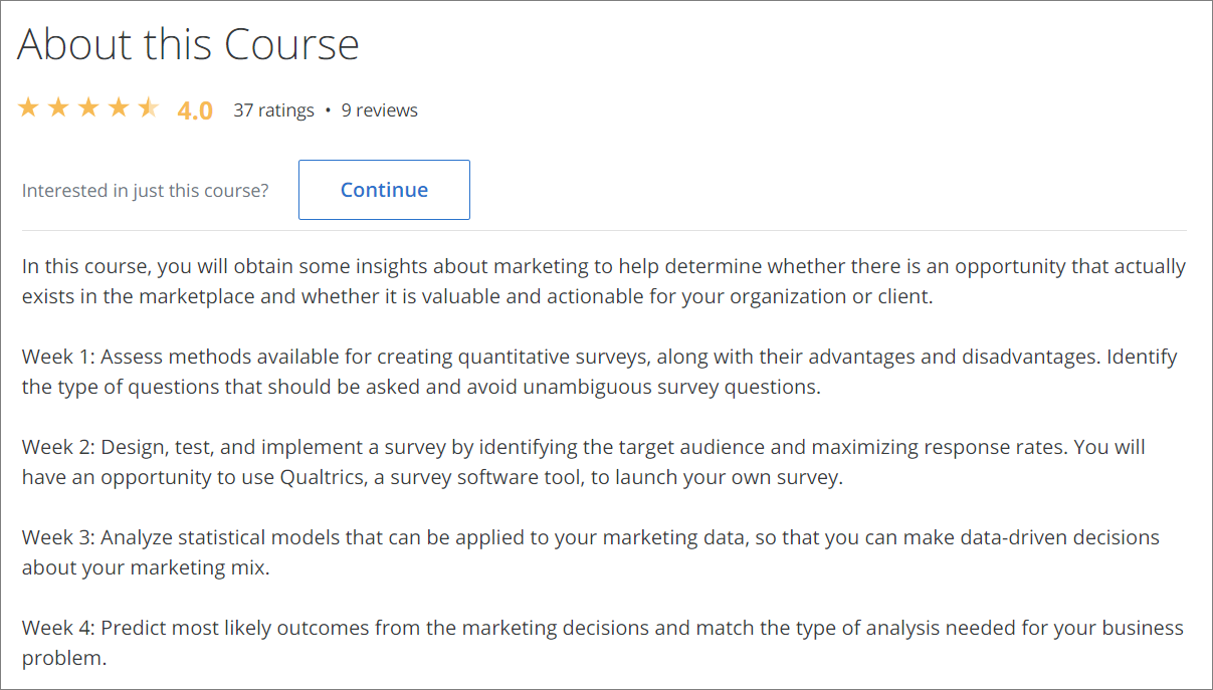
This is one of the courses that I had taken on Market Research myself. This is a good course to take because the instructor Susan Berman is a practitioner and shares the minute of the nuances.
Along with her, Prof. Olivier Rubel takes good care of the theoretical parts making this course a really good one.
Coursera groups a set of courses as a specialization. So, if you wish to dig deeper you can have a look at their Market Research Specialization.
- Market Research course, by Oxford Learning Lab, on Udemy
Before you confuse it with Oxford University, let me tell you that Oxford Learning Lab is an online provider of courses in the field of Marketing and Strategy. This is a course that I came across on Udemy during my research.
And this course does fit the bill in terms of the topics it covers. These are the topics that you should know of and be good at.
On Udemy, you can watch a few videos marked as ‘Preview’ before buying. I had a look at all of them and it convinced me enough to put it on this list. Do watch them yourself before you buy.
Also, Udemy courses are really economical (around ₹640 – ₹1500 when they are on sale). They are low-risk investments.
The prices can go up to as high as ₹3000. So if you find the course in that price range I mentioned above, go for it and buy it!
- Research Methods for Business Students, by Robert Barcik, on Udemy
This was the only other course on Udemy that made sense to me based on its contents. The free introduction video sets the objective right.
Robert Barcik takes you through actionable knowledge that you, as a business student, can apply on your projects right away.
I see this as another good course that will definitely leave you with enormous value.
3. Which Certifications should I go for?
A simple answer to this question – None.
You as a business student need to realize that you will have an MBA degree by the end of it.
Firstly, certifications may be good for a job role where you are being hired as a specialist. But trust me, being an MBA, there’s a lot more expected out of you than just market research.
Secondly, most certifications out there aren’t worth the paper their certificates are printed on. And before you begin to judge my online course recommendations that I gave above, here’s what you should know.
There is a difference between doing an online course for knowledge and doing it for the certificate. I can tell you right away that none of the Udemy or Coursera courses that you may do will get you a job, or that extra few lakhs in your offer.
None.
Not their certificate.
But the knowledge that the course gives you, that’s what the course is worth for.
So, if you are an MBA student, you will definitely end up with a job and a good one actually without any more certificates apart from your MBA degree.
4 How to Practice the skills to become a Market Research Analyst?

Most people will leave it at that, just before this paragraph. But if you are still reading this you are doing a great thing.
That’s because you need to know that even acquiring all that great knowledge from across the web isn’t going to do anything great to your actual knowledge.
Yes!
In order to increase your knowledge, you not only need to just learn it. But you need to go out and apply it somewhere.
And analyze what you did.
And then do it again.
It’s only then that you can deliver great results at the workplace from early on. Moreover, it is then when you can prove that you have an edge over the others.
Here are a few ways in which you can apply all your learnings.
1. Do your course projects with passion
![]() There have been such amazing projects in my B-school journey that could really teach you a lot about Market Research.
There have been such amazing projects in my B-school journey that could really teach you a lot about Market Research.
For example, in one of the subjects, we had the opportunity to survey the people of our chosen age group about their affinity towards different face wash brands.
My group went ahead of the brief and we also came up with recommendations for our chosen brand. Recommendations about where it lacks in brand recall and what things could be changed.
We could’ve done even more interesting things on that project!
We could have tried out our recommendations in the real world and did a confirmatory survey on that.
So for example, if we recommended a change on packaging (which, if I remember correctly, we did), we could have gone ahead and created the new packaging on Photoshop.
We could have then shown pictures of it to our respondents and ask them their reaction towards it.
And trust me, such brand recall surveys will be common if you are going in for an internship or a job as a Market Research Analyst.
But again the fact is that we as students don’t take these projects seriously.
I have been in those B-school projects myself. Almost 5 of them in every term. And I hate to admit that I did most of them just for a tick in the box.
The sadder part is that I did not learn much from them. And therefore, never in my life can I count those projects as real exposure for the subjects that I learned.
Also Read: Sex in Advertising and why it is time to Shake It Up!
Here’s what you need to know as an MBA student.
Classroom projects are important and people in the industry would take them really seriously only if you do them seriously. Especially the projects in Market Research.
Because only if you do them seriously and with passion, you would be able to tell them about it in interviews or mention them on your LinkedIn.
Therefore, for the electives that I mentioned above, please make sure that you take your projects seriously.
2. Write blog posts about your projects
![]() If you still have trouble in taking them seriously, I have a simple trick.
If you still have trouble in taking them seriously, I have a simple trick.
Make it a habit of writing a blog post either on LinkedIn or on Medium about your last good project work. Share them on your social networks (especially LinkedIn) and let people comment on it.
You would be amazed by the interest people will take in good work.
They will comment and ask you questions, they will suggest you things which you could’ve done.
This is one benefit of writing blog posts about your projects.
The second benefit is that it allows you to project your knowledge to your friends and more importantly for your business world connections.
People get to know about the things you are doing.
People get to know about your seriousness in it.
And most importantly, they get to know about your expertise and eventually authority in those topics.
So go out there, write blog posts about your work and build authority.
Also Read: How to Price your Product better in 8 Steps (Part 1 of 2)
3. Take up pro-bono consulting work
![]() Here is the best alternative to taking up certifications. Nothing shows better on your resume than good pro-bono consulting work.
Here is the best alternative to taking up certifications. Nothing shows better on your resume than good pro-bono consulting work.
Find small businesses in your neighborhood or around your hostel and offer them your services for free.
Trust me, most businesses (small or big) love MBA people working for them on their first-world problems.
If you are willing to become a Market Research Analyst, offer to be for them just that!
Tell them that you would like to do customer research. It could be anything.
You could do a market analysis for them to check how is this business is positioned vis-a-vis its competition.
You can do a market basket analysis on their customers i.e. if they agree to share some of their data.
There are literally ‘n’ number of different projects that you can take up with them.
Comment below on the article with the kinds of businesses that you have around you and I will help you frame a good project to do with them.
Also, I have stressed on pro-bono and avoided paid consulting work for a strong reason.
Let me know in the comments if you are willing to know about that.
5 Network and become a Market Research Analyst

MBA is about networking, isn’t it? One of the benefits of establishing meaningful relationships with more and more relevant people is that new opportunities open up.
I have networked with people during my MBA. And these were not my batchmates.
No, that’s probably the smallest and the most irrelevant part of networking.
The kind of networking I am talking about is leveraging the fact that I am from an IIM, one of the most reputed B-schools. And that there are people who look up to an IIM or at least regard the brand highly.
In your case, it could be your B-school.
There would be tons of people out there who will respect you for the B-school you are in. And that’s what you need to network with people in the industry or with the alumni of your B-school.
So, if you want to know how to become a Market Research Analyst, get on to Linkedin, find people who are already Market Research Analysts and then hit them up.
But there are different people out there and you need to approach them for different things, in a different manner.
- Networking to seek Guidance
- Networking for Job Opportunities
Let’s have a look at them.
______________
1. Network to seek Guidance
![]() This is the kind of networking you would do to learn more about what all things you need to do to become a Market Research Analyst. You need to start this kind of interaction right away.
This is the kind of networking you would do to learn more about what all things you need to do to become a Market Research Analyst. You need to start this kind of interaction right away.
Here’s what you need to do.
Step 1 – Find people on LinkedIn
Find people on LinkedIn who are working as Market Research Analysts at good firms. These people could be:
- Middle management people
- Alumni of your B-school
These are the people that can help you answer the question how to become a Market Research Analyst.
Moreover, the bigger criteria for selecting these people is that they shouldn’t be the people who are too senior in their organization.
The idea is that the person should give you their personal contact details within the first 3 interactions.
This should be your go-to-person for career advice in relation to how to become a Market Research Analyst.
Send them a Connection request and add them to your network.
Step 2 – Send them out a LinkedIn message
This message should state who you are, which B-school you are from. Tell them that you are a first-year or second-year student at that B-school and you are really interested in having a career being a Market Research Analyst.
Tell them that you wish to be in touch with them to seek guidance.
Step 3 – Ask questions about them and their work
Start asking them legitimate questions about them and their work. These questions could include
- What is your job profile?
- What are your responsibilities in the Market Research Analyst role?
- How are the growth opportunities like for you at your organization?
- How is the organization?
- What are the things that you like and don’t like about your work?
These questions and few more will make you understand what a Market Research Analyst really does at the organization. Also, if the person you are contacting is a recent B-school graduate then it is even better.
It will give you a great idea about what your work and responsibilities in the next 2-3 years after your MBA.
Apart from that, asking questions about the person and taking interests in their life will make the person feel more engaged and important.
Everyone likes when people take interest in them. Don’t they?
Step 4 – Get their contact numbers and talk
The final step is to be able to get at a call or a message distance away from them. Get their contact details, preferably their phone numbers.
Establish a relationship with them and start asking them all the doubts you have about your B-school journey. And about what all should you do so that it leads to a career in the field of Market Research.
Alumni of your B-school who are in such job roles are the best people for this kind of networking.
This networking will help you have a mentor who will be there for you always to get you ready for the world.
Step 5 – Alternatively, get in touch with me
If you feel I can help you better you may get in touch with me and I will be happy to help. What are the different ways in which you can get in touch with me?
Here are some of them.
- Comment on this post below and tell me that you need assistance
- Join my Facebook group Learn Marketing Strategy where I and many other people like you are always there to help and guide you
- Send me an email on darpan@superheuristics.com and let’s interact
Bonus Tip – Interact with Joydeep Sil and Ishaan Jain
Here is one person I would recommend for you to get in touch with. Joydeep Sil is a dear friend and senior from my B-school. He is currently (as on Jan 2019) working as a Business Analyst at Orion Inc.
Joydeep recently came back to campus for recruiting for his company (yes, he is that big a deal now). We had a healthy interaction about work, Marketing, and entrepreneurship.
Apart from being a killer Business Analyst professional, he is extremely knowledgeable about the Blockchain technology.
In fact, I personally follow all his updates about Blockchain on LinkedIn.
So, feel free to get in touch with him on his LinkedIn – Connect with Joydeep Sil on LinkedIn
Apart from Joydeep, you must consider reaching out to Ishaan Jain who (as on Jan 2019) is working with Gartner as a Market Research Analyst.
Prior to Gartner, he has over two years of experience as a Senior Analyst.
Gartner is one of the top organisations that students willing to pursue a career in Market Research aim for.
Ishaan, who is an engineer from Delhi Technological University (DTU), is one of the best people to tell you exactly about how to become a market research analyst. Moreover, I am sure he will be able to give you enough insight about the company as well. Connect with Ishaan Jain on LinkedIn
______________
2. Network for Job Opportunities
![]() This is the second kind of networking that you should do to make opportunities for yourself. This is the networking that you do with the CEO, CxO level and HR people so that they recognize you. And so that you could get a job with them.
This is the second kind of networking that you should do to make opportunities for yourself. This is the networking that you do with the CEO, CxO level and HR people so that they recognize you. And so that you could get a job with them.
Because obviously, all of this effort that you are putting in is for getting a job at a company that you want to work for.
Quite a lot of you would even have target companies that you want to join as Market Research Analysts.
Therefore, you need to do some solid networking outside your B-school to actually get that job.
I. Why should a top-tier B-school student network for a job?
People in the best of the B-schools may feel that why do we need to create more opportunities than we already have here.
And, sure, they are partially correct.
Being in a great, top tier B-school does ensure that there are a lot many companies coming in for you. But then there are a few things that you should know. These are:
1. The company or the kind the company you want to work for may not come on campus.
2. Even if such a company comes in, what are the chances that you would get shortlisted for that company?
I have seen CAs and CFAs not getting shortlisted for Banks and Financial Firms!
It’s a crazy lottery in B-schools as to who gets the shortlists for the interviews.
3. The best kind of preparation for a company’s interview is when you know their organization, their work and most importantly their internal lingo.
Considering all of this, there are reasons why you should network to create job opportunities for yourself even if you are at a top tier B-school.
One, because you can target your dream companies this way which may not come on the campus.
And two, because even for the firms that do come on campus, you would be prepared far better if you were already interacting with the company’s people from long ago.
II. When to start networking for job opportunities?
Now, a point to note here.
Even though this networking is purely to get a job, students make the terrible mistake of initiating it just a few weeks or even a few days before their placements.
That’s a really stupid and unwise thing to do.
Company officials and especially HRs are loaded with tons of such emails from students like you from the hundreds and thousands of B-schools that are out there.
What makes you think that your mail will stand out?
It will not.
Therefore, the trick is to start this networking for jobs right from your first year.
Yes, that’s true. Even if you are looking for final placements and not a summer internship at that firm, you really need to start that early.
III. How to network for job opportunities?
What a lot of people might think should be the culmination of all the efforts they put in becoming a Market Research Analyst is actually the starting of it.
So, here is what you need to do. If you are in the first-year of MBA, this is the time. If you are in the second-year you can start now as well.
Step 1 – List down your dream companies
Take a day and research about the companies that are doing good. Or if you already have some target companies in your mind then nothing like it.
List down all of these companies somewhere.
Step 2 – Go to their websites and find the CxO’s email
Once you know those 3-4 companies, go to their websites and find who their CEOs or any other CxOs are. Take down their email ids if they are given on the website.
If not, then come back to Google and search for these people by the name. You are likely to find their email ids somewhere. You could make your work easier if you type in the following search queries
Name of the CxO + “email”
Name of the CxO + “@”
This way you will get all the results that have the email addresses of these people.
Step 3 – Send them a mail, seeking guidance and not jobs
As I mentioned, these guys get tons of emails from B-school students like you asking for jobs. And they don’t reply to most of them.
Therefore, you should not ask for jobs. You should ask for guidance. And that’s the reason why you need to start as early as when you are in your first year.
For example, I tried exactly this in my first year. And it worked almost every time.
I mailed the CEO of a top Data Analytics company of India. Here is what I wrote to him.
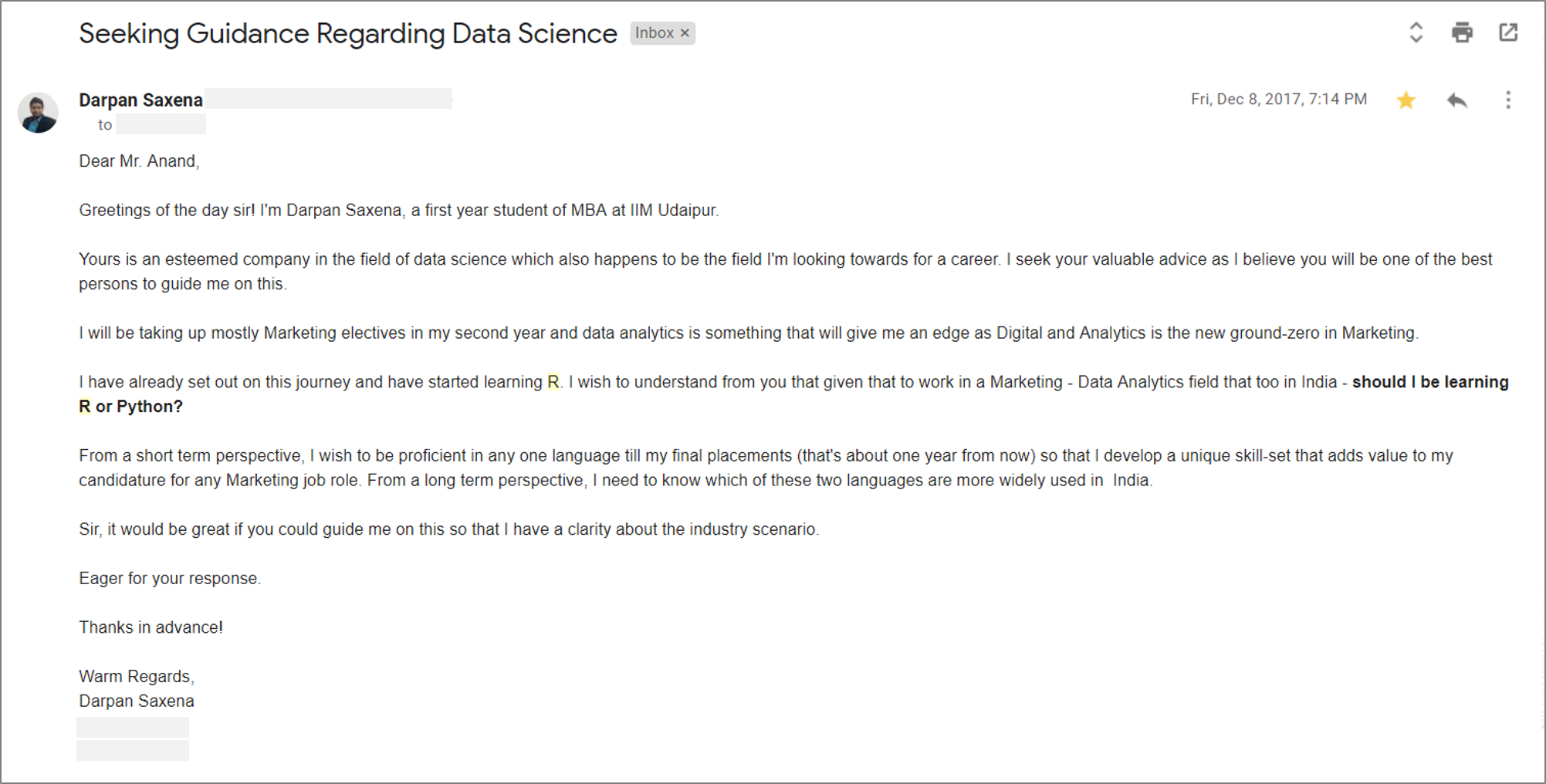
Notice my subject line. How I mentioned “Seeking Guidance…” and not “Seeking Job Opportunities…”.
Further, if you read my mail, never have I mentioned anything about getting a job or an internship at his firm.
How does this help?
It helps him look at me as an innocent first-year student who has the passion and hunger to learn. The person will definitely reply. And he did.
They will share all of their knowledge and wisdom with you.
And you should not stop at just one email.
Send them an email once every 3-4 weeks asking different and genuine doubts and queries.
Take a hint from the email that I sent and you know what other things you can ask.
Build a strong relationship with them over the entire year. Accept them as your mentor and tell them this.

Notice how I had exchanged over 10 emails with that person in those 10 months.
Eventually, as you grow your skills with their blessings they will recognize you as one of their own.
And then is the time to politely ask them if they have an opening for you.
Conclusion
That was most of what I could share with you on how to become a Market Research Analyst after MBA. In the entire article, I shared with you about what does a Market Research Analyst do, what skills are required to become one, how to acquire those skills in and outside your B-school and finally how to network and get a Market Research Analyst job.
Following all of the steps that I mentioned will guarantee that you will be in a great position to bag the type of Market Research Analyst job that you want.
This is definitely one of the most detailed pieces of information that you will find. However, if you have any doubts regarding this, feel free to comment below. Also, feel free to let me know if you want me to write about any other job role that you are planning to target.

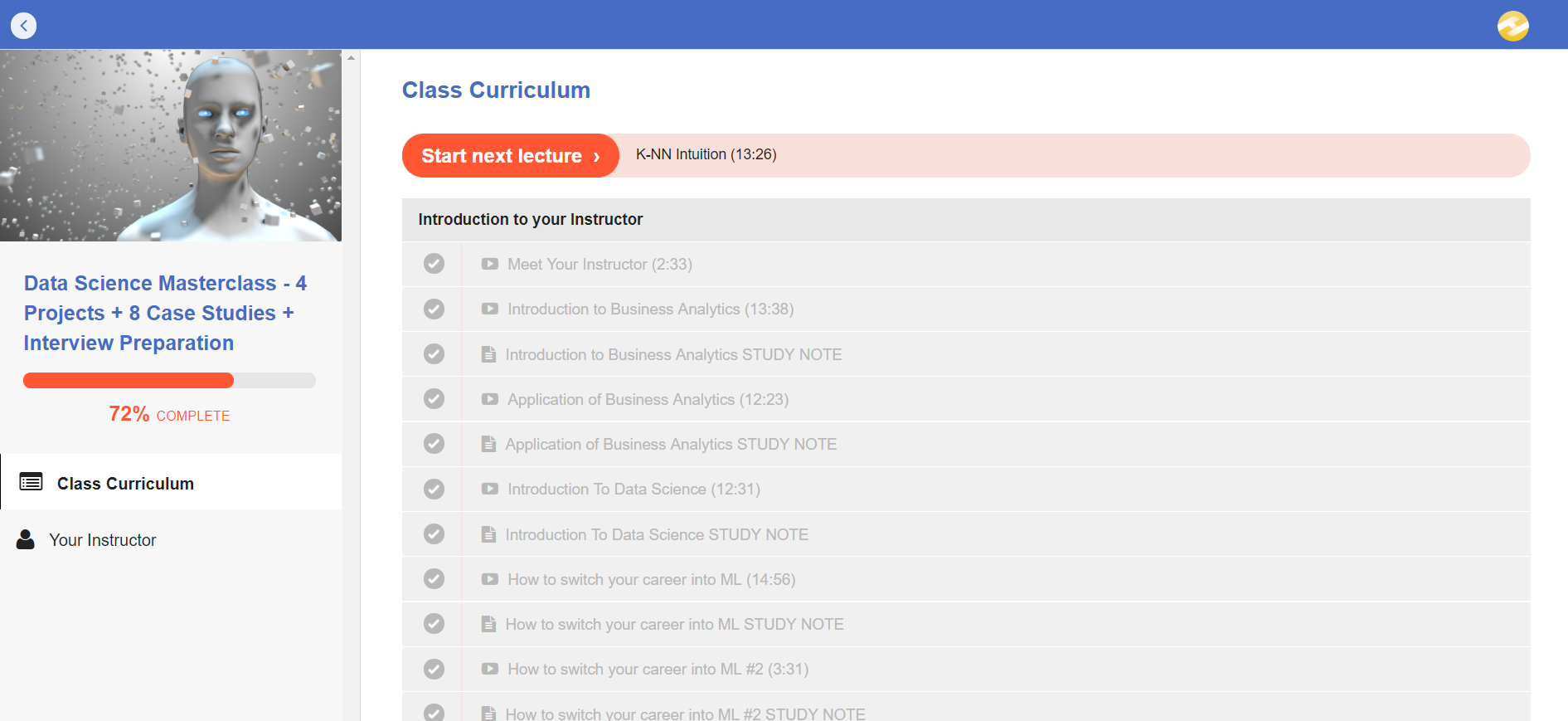
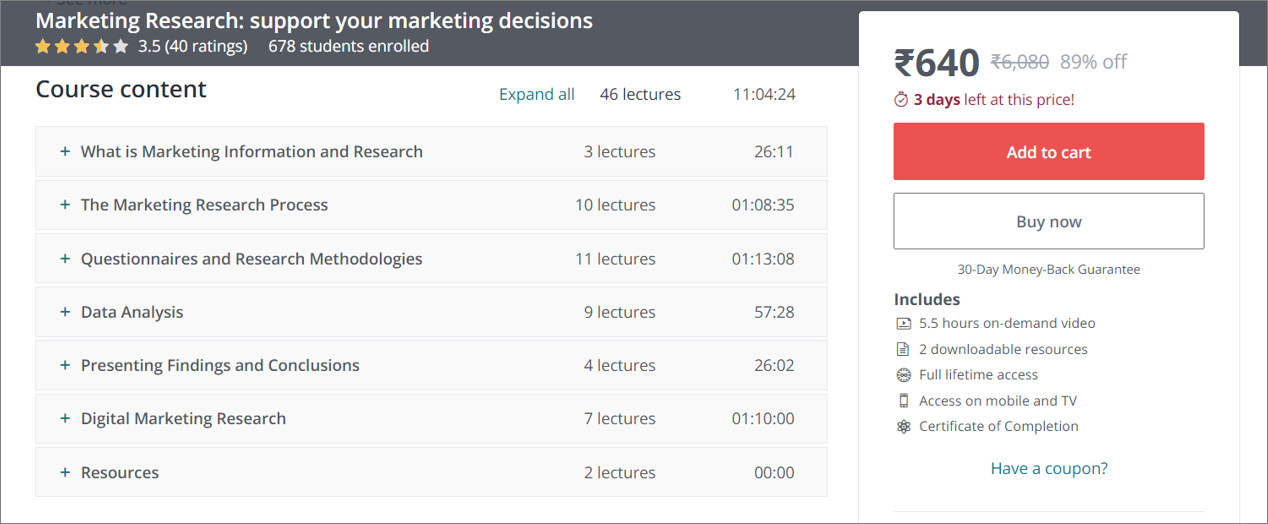
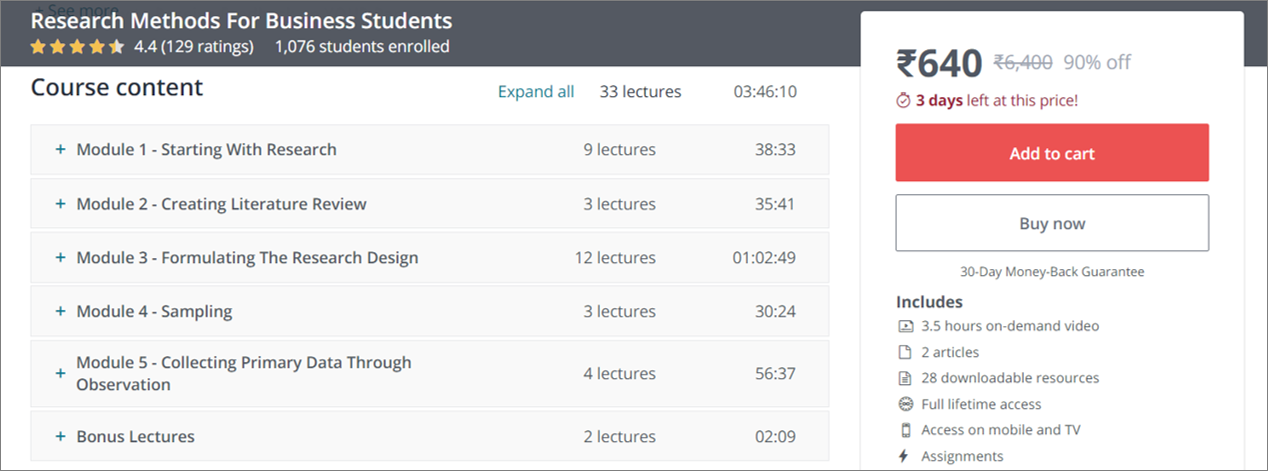

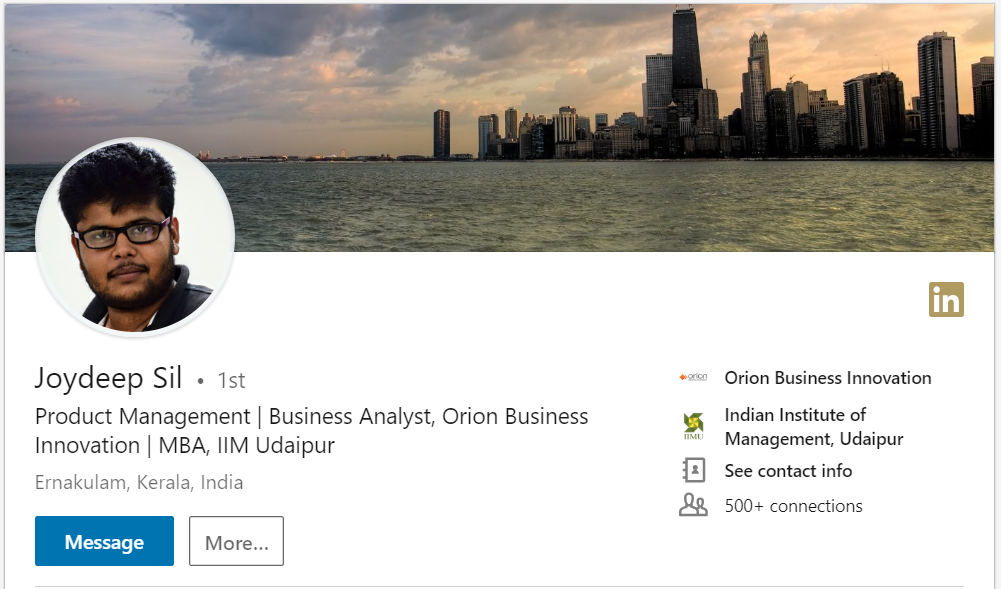







simple comprehensive article thanks for the great effort .
Thanks for reading, Ahmed 🙂
At the beginning of the article, you mention that you give a guide on how to become a market research analyst in India. Does this information apply in other countries like Vietnam? As What I’ve researched, analytical skills are extremely important for market research analyst but I don’t see it in your article. Is it important? Please help me with the questions. Thanks in advance
Hi Ngan, thanks for reading the article. While I may not have mentioned that analytical skills are important – you can imply from the tools that I am suggesting (eg. MS Excel) that such thought-process would be required. A point close to that is where I mentioned that MS Excel is crucial. Further important analytics technologies are also important.
Thank you so much for your response. It’s really helpful. But I’d like to ask you a question. You mention that you give a guide on how to become a market research analyst in India. Does this information apply in other countries like Vietnam?